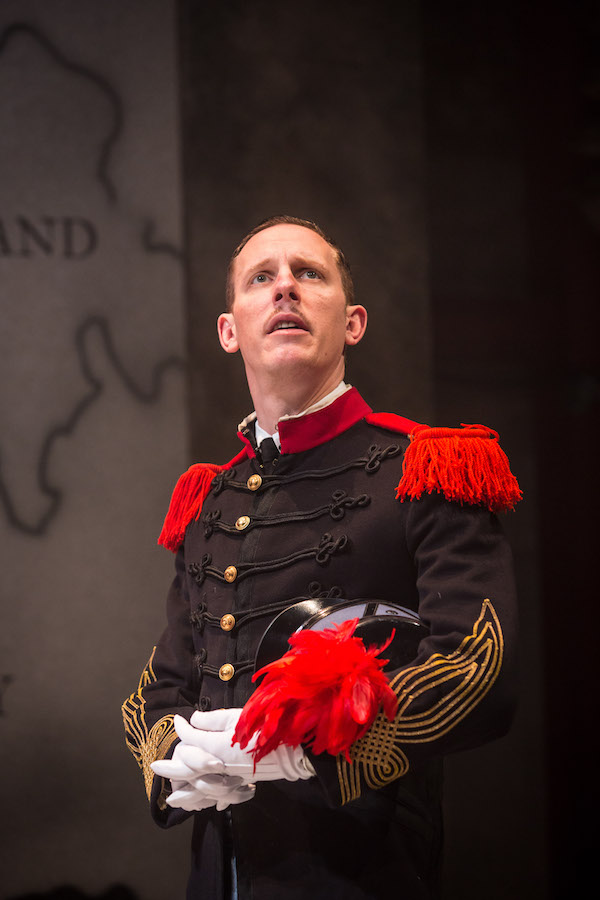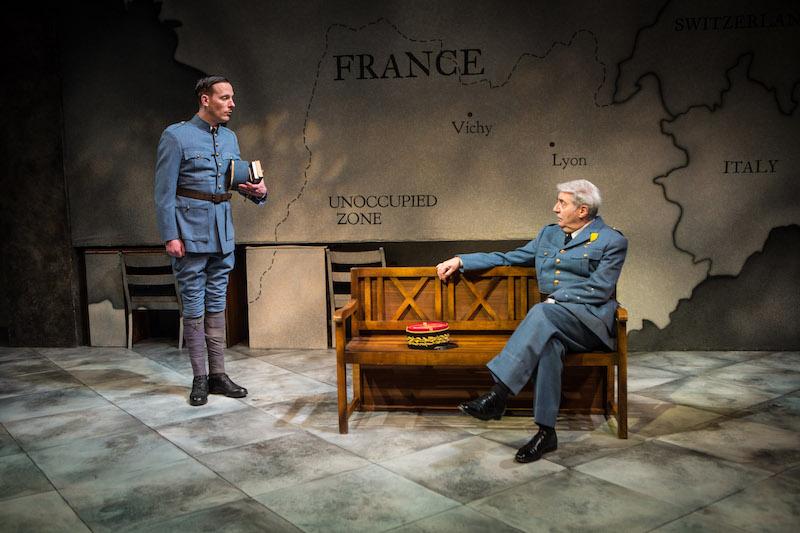Theatregoers suffering from First World War fatigue may want to pass on Jonathan Lynn’s merely competent historical drama about two mythic figures: Charles de Gaulle and Philippe Pétain. It’s a fascinating subject – de Gaulle had his former mentor tried for treason in 1945 after Pétain led France into Nazi collaboration – but Yes Minister co-creator Lynn, who also directs, seems unsure whether it warrants winking satire or solemn historical re-enactment, settling for a fitfully engaging hybrid.
The relationship began in 1913, with de Gaulle supporting Pétain's (Tom Conti) unpopular military tactics – he favoured heavy artillery and shrewd defensive strategy, rather than running into the line of fire waving bayonets. It’s the first of many occasions where Lynn’s heroes demonstrate extraordinary foresight, with de Gaulle (Laurence Fox, pictured below) realising before anyone else that the Maginot Line would prove a fatal weakness. Infallibility makes for deathly drama, so thankfully the play argues that their godlike powers were yoked to fatal pride.
 They are also, in Lynn’s portrait, an amusing odd couple: gruff realist Pétain, who rose from humble origins to become the hero of Verdun, and the intellectually rapacious but socially challenged de Gaulle. Both struggled to navigate the politics of military high command in their quest for power, and both fought passionately for France, but their paths diverged when Pétain reasoned the safeguarding of lives warranted ethically murky compromise, while de Gaulle favoured a romantic ideal of nationhood over short-term survival.
They are also, in Lynn’s portrait, an amusing odd couple: gruff realist Pétain, who rose from humble origins to become the hero of Verdun, and the intellectually rapacious but socially challenged de Gaulle. Both struggled to navigate the politics of military high command in their quest for power, and both fought passionately for France, but their paths diverged when Pétain reasoned the safeguarding of lives warranted ethically murky compromise, while de Gaulle favoured a romantic ideal of nationhood over short-term survival.
Meaty stuff, as is the tension between Christian compassion and brutal wartime decision-making, illuminated by de Gaulle’s study of Nietzsche, but Lynn’s too-short scenes don’t allow space for complex ideas to breathe. Huge character moments are also truncated, with Pétain’s critical decision to sign the armistice – resistance through collaboration, as he later tries to frame it – passing in a flash. There’s more time given to a bizarrely protracted sequence which mainly serves to demonstrate that Conti can wring plenty of laughs out of acting drunk.
A couple of personal scenes prove effective: de Gaulle suffering through an awkward blind date with no-nonsense wife-to-be Yvonne (Ruth Gibson making the most of an underwritten part), and later agonising over the birth of their daughter, Anne, who suffered from Down’s syndrome. The initially one-note character becomes, in Fox’s hands, an interesting blend of self-important prig, vulnerable dreamer and ruthless autocrat in the making. Conti, who struggles to enliven vast swathes of exposition and blunt statements like “You’re the son I never had”, fares less well. His cranky Pétain doesn’t noticeably age or develop over the course of the play, and scenes where he semi-confesses to a priest in prison, thus triggering flashbacks, are irredeemably clunky. Niall Ashdown, James Chalmers and Tom Mannion decently cover multiple supporting roles.
Georgia Lowe turns the back wall into a handy map showing the territories under dispute, and Andrea J. Cox provides a tasteful soundscape of distant gunfire and sincere strings. However, given that Lynn’s play champions leaders who gamble and break the rules, one might wish his conservative production would follow suit.















Add comment